Introduction to the New Testament (2021 Boccaccini), course
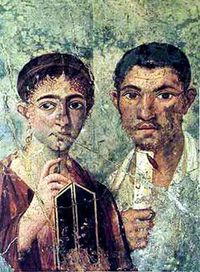



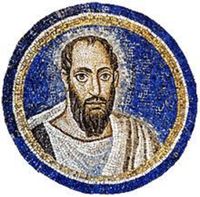

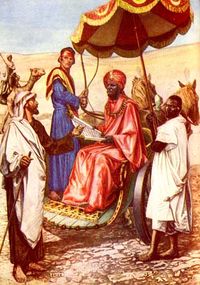


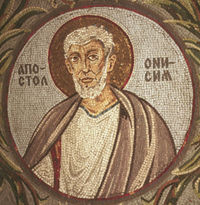

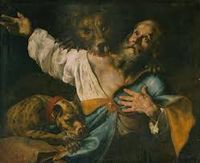



Introduction to the New Testament is a course offered by Gabriele Boccaccini at the University of Michigan in the Winter 2021.
Description
The course offers an Introduction to the Early Christian Literature and the development of the Early Christian movement from the death of Jesus of Nazareth until the mid-2nd Century.
The approach is historical and chronological and no distinction is made between "canonical" and non-canonical" literature. The New Testament documents are studied alongside with the writings of the Apostolic Fathers and the New Testament Apocrypha, The development of the early Church is illustrated in the diversity of its components.
Christianity is presented originally as a Jewish messianic movement which grew up out of the diverse world of Second Temple Judaism to gradually parting, after the destruction of Jerusalem in the year 70, from the other major Jewish movements of the time--Hellenistic Judaism and the nascent Rabbinic movement.
Syllabus
- Meeting Place: online.
- Office Hours: After class (online)
- Readings: The New Testament" (New Revised Standard Version of the Bible), and the "Apostolic Fathers" (texts are available online). If you like to purchase a printed copy: The New Testament and Other Early Christian Writings: A Reader by Bart D. Ehrman (2003), or The Holy Bible: New Revised Standard Version with Apocrypha by Bruce M. Metzger (1991) (available at www.amazon.com)
- Text-Books:
- 1. Paul's Three Paths to Salvation, by Gabriele Boccaccini (available at www.amazon.com)
- 2. The New Testament: A Historical Introduction to the Early Christian Writings, by Bart D. Ehrman, 4th (2007) or 5th (2011) or any following editions (available at www.amazon.com)
- GSI: Ronald Nicklaus
Part I : Introduction
1. Tue Jan 19, 2021:
- General Introduction. What is the New Testament?
- Website: New Testament
2. Thu Jan 21, 2021:
- See (in preparation): "From Jesus to Christ (PBS Documentary)" (part I: Jesus of Nazareth) <YouTube (first 54 minutes)>
- Website: Jesus of Nazareth
3. Tue Jan 26, 2021:
- The life of the first Christian community - A Jewish messianic community (with the Sadducees, the Pharisees, the Essenes and Hellenistic Jews)
- Website: Gathering of the Twelve at Jerusalem, Christian Pentecost, Sharing of Goods, Second Arrest of the Apostles, Choice of the Seven, Martyrdom of Stephen
4. Thu Jan 28, 2021:
- The attitude towards Gentiles.
- Website: Spread of the Gospel to Samaria, Baptism of the Eunuch & Conversion of Cornelius
Part 2 : Paul
5. Tue Feb 2, 2021:
- Paul's Early Life -- Paul Persecuting the Church -- Conversion of Paul -- Paul's First Missionary Journey
- Read: Paul's textbook (chap. 1-2: "Paul the Jew and Paul the Christian," & "Paul the Convert Who Never Converted", 26-39)
6. Thu Feb 4, 2021:
- Second Missionary Journey. Paul's Apocalyptic Message (The letter to Thessalonians)
- Read: 1 Thessalonians
- Read: Paul Textbook (chap. 3: "Paul the Apocalyptic Jew," 40-54)
7. Thu Feb 9, 2021:
- Paul's Christology Jesus the Lord and the Second Adam (Philippians)
- Read: Apostles' Creed -- Gods & Demigods -- Philippians
- Read: Paul Textbook (chap. 6: "The Divine Christology of Paul the Jew," 90-104)
8. Tue Feb 11, 2021:
- Paul's Moral Message (Corinthias). Against Sexual Immorality
- Read: Idolatry Sexual Immorality, 1 Corinthians, 2 Corinthians
- Read: Paul Textbook (chap. 4 & 5: "Paul the Messianic Jew," 55-67; & "The Eschatological Gift of Forgiveness," 68-89)
9. Tue Feb 16, 2021:
- Romans. The Three Paths to Salvation of Paul the Jew. Forgiveness by Faith Only.
- Read: Letter to the Romans, Last Judgment
- Read: Paul Textbook (chap. 7: Justified by Faith, Judged by Works, 105-130)
10. Thu Feb 18, 2021:
- Paul's Ethnic Message (Jews & Gentiles)
- Read: Galatians -- Council of Jerusalem -- Incident at Antioch
- Read: Paul Textbook (chap. 8: Paul the Apostle to the Lost Sheep Among the Nations, 131-156)
11. Tue Feb 23, 2021:
- Paul's Social Message (Women & Slaves)
- Read: Letter to Philemon, Women, Slavery
- Read: Paul Textbook (chap. 9: Paul the Herald of God's Mercy Toward Sinners, 157-162)
12. Thu Feb 25, 2021:
- James & 1 Peter. Forgiveness by Faith and Works
- Read: Letter of James & 1 Peter
13. Tue Mar 2, 2021:
- Paul is arrested & arrives in Rome
- Reading: Acts of Apostles (21-28)
- Website: Paul's Last Visit to Jerusalem, Paul in Caesarea & Paul's Journey to Rome
14. Thu Mar 4, 2021:
- The Destruction of the Temple - Video III
15. Tue Mar 9, 2021:
- Midterm exam
Part 3 : The Gospels
16. Thu Mar 11, 2021:
- See (in preparation) : "From Jesus to Christ (PBS Documentary)" (part 3: Gospels) <YouTube>
- The Gospel of Mark
17. Tue Mar 16, 2021:
- The Gospel of Matthew and the Gospel of Luke
18. Thu Mar 18, 2021:
- The Deutero-Pauline Tradition. Hebrews. 2 Thessalonians – Colossians – Ephesians
- See also Apostles' Creed, Priesthood
< BREAK - Tue Mar 23, 2021 >
19. Thu Mar 25, 2021:
- The Letter of Barnabas. An Anti-Jewish Christianity? The Theology of Supersession. The Rise of Christian Anti-Seminitism.
- Website: see Letter of Barnabas, Barnabas, Bible Code, Antisemitism
- Reading: Letter of Barnabas
- Text-Book: “The Epistle of Barnabas and Melito’s Passover Sermon”
20. Tue Mar 30, 2021:
- Christianity without Judaism: Gospel of Thomas. The Challenge of Gnosticism
- Reading & Website: Gospel of Thomas
21. Thu Apr 1, 2021:
- Gospel of John (I): The Divinity of the Christ-Logos
- Reading & Website: Gospel of John, Wisdom Personified
22. Tue Apr 6, 2021:
- Gospel of John (II): The Role of the Spirit
23. Thu Apr 8, 2021:
- Continuing the Tradition of John. 1, 2, 3 John - Revelation of John
- Reading & Website: Letters of John, Revelation of John
24. Tue Apr 13, 2021:
- Continuing the Tradition of James. Gospel of the Ebionites, Letter of Jude -- Didache -- Shepherd of Hermas ...
- Continuing the Tradition of Peter. Second Letter of Peter – The Gospel of Peter – The Apocalypse of Peter -- 1 Clement -- 2 Clement
25. Thu Apr 15, 2021:
- Continuing the Tradition of Paul. The Age of Bishops (Ignatius of Antioch; Letters of Ignatius, The Pastoral Letters)
26. Tue Apr 20, 2021:
- Wrap-up session. Conclusion of the course.
Final Exam - Apr ??, 2020 (in class)
Final questions
- 1. What is one thing that has surprised you the most? (Wow! I did not know it! I never heard of it!)
- 2. What is one thing that you thought about the NT and that you have realized it was inaccurate or incorrect? (Wow! I was wrong!)
- 3. What is one thing that you have heard commonly repeated about the NT and that you have realized it is inaccurate or incorrect? ( Wow! They are wrong!)
- 4. What is in your opinion the central element in the earliest Christian message?
- 5. What is the most important thing that you have learned in the class?
Grading System and Requirements
[Read this section of the syllabus very carefully. The syllabus is like a contract between the student and the instructors, which we are all bound to respect. Some variations in the grading system and requirements will be communicated by the GSI]
ATTENDANCE: The course is based on lectures, weekly discussion session, three written exams, and one paper. Regular attendance is mandatory. If you happen to miss a session, it is your responsibility to ask the Professor or the GSI or a class-mate for information about what was discussed in class. Students whose attendance is poor (that is, have missed 6-10 total classes, either lectures or discussion sessions, without justification) will see their final grade reduced by six percentage points. Students who do not attend the class regularly (that is, have missed more than 10 classes, either lectures or discussion sessions, without justification), or do not fulfill each and all the requirements of the course, will not be graded and will receive a NR report.
GRADING SYSTEM: The final grade is based on five elements (of which the last one is optional): (a) Participation: 10% -- (b) First Midterm: 10% -- (c) Second Midterm: 20% -- (d) Paper 20% – <(e) Oral Presentation 0%> -- (f) Final exam: 40% -- (f) Re-taking of the first & second Exam (optional): possible increase
(a) Quality of participation in class and discussion sessions makes 10% of the final grade. The evaluation will be made conjunctly by the Professor and the GSIs on the basis of the student’s attention, comments, questions, commitment for an enjoyable environment, etc., as follows: Outstanding (100%) / Excellent (95%) / Very good (90%) / Good (85%) / Average (80%) / Poor (75%) / Very poor (70%) / Insufficient (65% or less)
(b-c) The two mid-term exams are a series of multiple-choice questions from the lectures and the textbooks. The results of the test will be discussed in class and in the discussion sessions. The grade is determined proportionally to the amount of questions correctly answered (unanswered questions are counted as incorrect), as follows:
- A+ (100%-99%) / A (98%-93%) / A- (92%-90%)
- B+ (89%-87%) / B (86%-82%) / B- (81%-80%)
- C+ (79%-78%) / C (77%-75%) / C- (74%)
- D+ (73%) / D (72%-71%) / D- (70%)
- F (69% or less)
The first midterm exams (10% of the final grade) is a series of 50 questions about the contents of the first 9 lectures of the course . It is aimed to be a sort of preparation to the more important second mid-term and final exams. If your grade is F, you must submit a written petition (by e-mail) to the Professor and receive written permission (by e-mail) to continue the class, provided that your attendance is good. If you need or want to improve your grade, you may retake your exam, following the instructions below (f).
The second midterm exam (20% of the final grade) is a series of 100 questions (80 new questions about the contents of the second part of the course (i.e. lectures 10-22), plus 20 questions from the first midterm). No re-taking will be allowed, and no individual curve will be granted, under any circumstance. If your grade is F, you must submit a written petition (by e-mail) to your GSI and receive written permission (by e-mail) to continue the class, provided that your attendance is good. If you need or want to improve your grade, just followed the instructions below (f).
(d) As a written assignment (20% of your final grade), you have to pick up a scholarly book or a novel or play focusing on Paul of Tarsus or any of Apostles in the period after the death of Jesus (a list will be provided and your choice must be pre-approved by your GSI) and write (by Apr 5, 2020) a (400-500 word) synopsis of its content, and a 1 or 2 page commentary on the use that book or novel or play made of NT sources and on the interpretation given to the events as compared to the presentation offered in the course,
- A+ = 99% / A = 95% / A- = 91%
- B+ = 87% / B = 84% / B- = 81%
- C+ = 78% / C = 76% / C- = 74%
- D+ = 73% / D = 72% / D- = 70%
The best summaries will be posted online in “4 Enoch: The Online Encyclopedia of Second Temple Judaism” <www.4enoch.org> under your name.
<(e) Papers will be presented orally during discussion sessions (5-10m each) or during lectures (0% of the final grade).>
(f) The final exam (40% of the final grade) is a series of 150 multiple-choice questions aimed at a general review of the entire course: 100 new questions about the contents of all four parts of the course (but with special emphasis on the third and four parts), plus 50 questions from the first two exams (15+35, respectively). The grading system will follow the same criteria as the midterm exams.
(f) [Optional] The Instructor’s goal is to help the deserving students, who may have some initial difficulties, to improve their grade. You may choose to retake your first and/or second exam. The questions will be the same, except for 5 new questions (in the first exam) or 10 new questions (in the second exam). Depending on your new grade, you will have an increase up to 8 points (if you get an A+), 6 points (A), 4 points (A-) or 2 points (B+) points (0 if you get B or less) on the grade of your exam. In no case your percentage can overcame 84% (or B). No retake is allowed for the final exam.
NOTE: The use of personal electronic devices (lap-top, iPad, iPhone, etc.) is allowed in the classroom, ONLY for the special needs of students with disabilities. Individual students may be directed to turn off personal electronic devices if the devices are not being used for class purposes (and will receive an unexcused absence for the day). If the student does not comply, the student may be asked to leave the classroom (and a sanction of -30 points will be applied to their participation grade).
The College of Literature, Sciences, and the Arts at the University of Michigan is a community in which personal responsibility, honesty, fairness, respect, and mutual trust are maintained. Students must behave honorably and take responsibility for their own actions. In addition, students are expected to take constructive action if they witness or are aware of behavior that violates the standards of academic integrity. Any student determined to have engaged in any form of academic dishonesty—including but not limited to plagiarism, cheating, unauthorized collaboration, and attendance forgery—will receive a zero on the assignment, and in particularly serious cases, a failing grade in the entire course. In accordance with University policy, all cases of misconduct will be reported to the Office of the Assistant Dean for Undergraduate Education.
VERY IMPORTANT !! If you have any questions or something goes wrong, or you realize that your attendance is going to be poor or insufficient, please do not wait until the very last moment to express yourself. I will be always available to talk to you immediately after class or during my office hours or, if necessary, scheduling a meeting at a different time. We can find together a solution to (almost) every problem. But, please, don’t ask the impossible when there is no more time.
IF SOMETHING GOES WRONG,
NEVER BLAME OTHERS.
BLAME NO ONE BUT YOURSELF.
IF YOU ACCEPT RESPONSIBILITY, YOU ARE IN THE POSITION TO DO SOMETHING ABOUT IT.
WHATEVER OTHER PEOPLE’S FAILINGS MIGHT BE, YOU ARE THE ONE TO SHOULDER RESPONSIBILITY.
THERE ARE NO EXCUSES.
REMAIN FOCUSED: YOUR GOAL IS TO LEARN AS MUCH AS YOU CAN: ALL THE REST IS REALLY NOT IMPORTANT
!! BE SMART AND RESPONSIBLE: ENJOY THE CLASS !!





